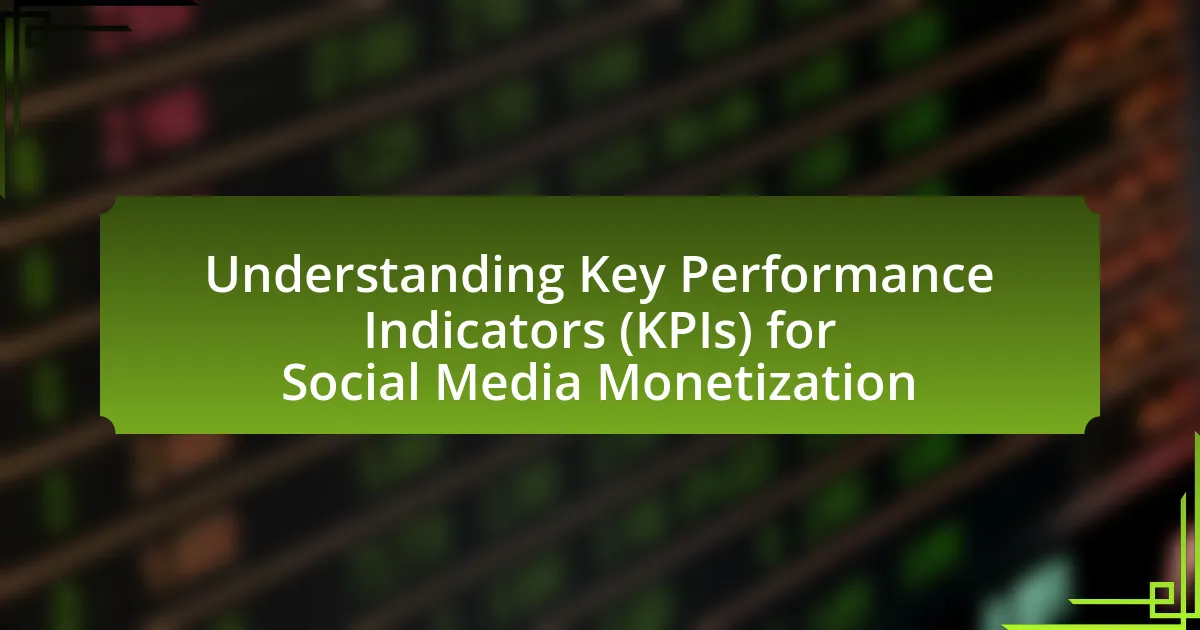Key Performance Indicators (KPIs) are essential metrics that measure the effectiveness of social media monetization strategies in achieving business objectives. This article explores the significance of KPIs, including engagement rates, conversion rates, and return on investment (ROI), and their role in guiding decision-making and optimizing marketing efforts. It discusses common types of KPIs, the importance of aligning them with business goals, and best practices for tracking and analyzing these metrics. Additionally, the article addresses challenges businesses face in utilizing KPIs and offers practical tips for enhancing their effectiveness in social media monetization.
-in-Social-Media-Monetization-1.webp)
What are Key Performance Indicators (KPIs) in Social Media Monetization?
Key Performance Indicators (KPIs) in social media monetization are measurable values that demonstrate how effectively a social media strategy is achieving its business objectives. These KPIs typically include metrics such as engagement rates, conversion rates, return on investment (ROI), and customer acquisition costs. For instance, a study by Hootsuite found that businesses that track social media KPIs are 30% more likely to achieve their marketing goals, highlighting the importance of these indicators in assessing the success of monetization efforts.
Why are KPIs important for social media monetization?
KPIs are important for social media monetization because they provide measurable metrics that help assess the effectiveness of social media strategies. By tracking KPIs such as engagement rates, conversion rates, and return on investment, businesses can identify which content drives revenue and optimize their marketing efforts accordingly. For instance, a study by HubSpot found that companies using data-driven marketing strategies, including KPIs, are six times more likely to be profitable year-over-year. This demonstrates that KPIs not only guide decision-making but also enhance financial outcomes in social media monetization.
How do KPIs influence decision-making in social media strategies?
KPIs significantly influence decision-making in social media strategies by providing measurable data that guides strategic adjustments. For instance, metrics such as engagement rates, conversion rates, and reach allow marketers to assess the effectiveness of their campaigns. When a specific KPI indicates low engagement, decision-makers can pivot their content strategy to better resonate with their audience. Research from HubSpot shows that companies using data-driven strategies are 6 times more likely to be profitable than those that do not. This demonstrates that KPIs not only inform immediate tactical changes but also shape long-term strategic planning in social media marketing.
What role do KPIs play in measuring success?
KPIs serve as essential metrics for evaluating success by providing quantifiable data that reflects performance against specific objectives. They enable organizations to track progress, identify areas for improvement, and make informed decisions based on measurable outcomes. For instance, a study by the Harvard Business Review found that companies using KPIs effectively can improve their performance by up to 30%. This demonstrates that KPIs not only facilitate accountability but also drive strategic alignment and operational efficiency, ultimately leading to enhanced success in achieving business goals.
What types of KPIs are commonly used in social media monetization?
Commonly used KPIs in social media monetization include engagement rate, conversion rate, customer acquisition cost, and return on investment (ROI). Engagement rate measures the level of interaction (likes, shares, comments) relative to total followers, indicating content effectiveness. Conversion rate tracks the percentage of users who take a desired action, such as making a purchase after engaging with social media content, reflecting the success of marketing efforts. Customer acquisition cost calculates the total cost of acquiring a new customer through social media campaigns, providing insight into the efficiency of spending. ROI assesses the profitability of social media investments by comparing revenue generated against costs incurred, ensuring that monetization strategies are financially viable. These KPIs are essential for evaluating the performance and effectiveness of social media monetization strategies.
What are engagement metrics and why are they significant?
Engagement metrics are quantitative measures that assess how users interact with content on social media platforms, including likes, shares, comments, and overall reach. These metrics are significant because they provide insights into audience behavior, indicating the effectiveness of content in capturing attention and fostering interaction. For instance, a study by HubSpot found that posts with higher engagement rates lead to increased brand visibility and customer loyalty, demonstrating the direct correlation between engagement metrics and successful social media monetization strategies.
How do conversion metrics impact monetization efforts?
Conversion metrics directly influence monetization efforts by providing quantifiable data on user engagement and purchasing behavior. High conversion rates indicate effective marketing strategies and content that resonate with the audience, leading to increased revenue opportunities. For instance, a study by HubSpot found that businesses with strong conversion optimization strategies can see conversion rates increase by up to 300%. This data allows companies to refine their marketing tactics, allocate resources more effectively, and ultimately enhance their profitability through targeted campaigns.
How can businesses identify the right KPIs for their social media strategy?
Businesses can identify the right KPIs for their social media strategy by aligning their objectives with measurable outcomes. This involves first defining specific goals, such as increasing brand awareness, driving website traffic, or generating leads. Once goals are established, businesses should select KPIs that directly reflect these objectives, such as engagement rates, click-through rates, or conversion rates.
For instance, if a business aims to enhance brand awareness, it might track metrics like reach and impressions. According to a study by HubSpot, 70% of marketers say that measuring social media ROI is crucial, indicating the importance of selecting relevant KPIs that can demonstrate the effectiveness of social media efforts. By continuously analyzing these KPIs, businesses can adjust their strategies to optimize performance and achieve their desired outcomes.
What factors should be considered when selecting KPIs?
When selecting KPIs for social media monetization, it is essential to consider alignment with business objectives, relevance to target audience, and the ability to measure performance effectively. Alignment ensures that the KPIs directly support the overarching goals of the organization, such as increasing revenue or enhancing brand awareness. Relevance to the target audience guarantees that the metrics reflect user engagement and behavior, which are critical for effective monetization strategies. The ability to measure performance effectively means that the KPIs should be quantifiable and actionable, allowing for data-driven decision-making. For instance, a study by the American Marketing Association highlights that organizations that align their KPIs with strategic goals see a 30% increase in performance outcomes.
How can businesses align KPIs with their overall goals?
Businesses can align KPIs with their overall goals by ensuring that each KPI directly reflects a specific objective within the broader strategic framework. This alignment involves identifying key business objectives, such as increasing revenue or enhancing customer engagement, and then selecting KPIs that measure progress toward these objectives. For instance, if a business aims to boost revenue, relevant KPIs might include sales growth percentage or average transaction value. Research indicates that organizations with aligned KPIs are 30% more likely to achieve their strategic goals, demonstrating the effectiveness of this approach in driving performance and accountability.

How do KPIs affect social media monetization strategies?
KPIs directly influence social media monetization strategies by providing measurable metrics that guide decision-making and optimize revenue generation. For instance, engagement rates, conversion rates, and audience growth are critical KPIs that help businesses assess the effectiveness of their content and advertising efforts. By analyzing these metrics, companies can identify which strategies yield the highest returns, allowing them to allocate resources more efficiently. Research indicates that brands that actively track and adjust their strategies based on KPIs can increase their revenue by up to 30%, demonstrating the tangible impact of KPIs on monetization efforts.
What is the relationship between KPIs and content performance?
KPIs, or Key Performance Indicators, are metrics that evaluate the success of content performance in achieving specific business objectives. The relationship between KPIs and content performance is direct; KPIs provide measurable data that reflects how well content engages the audience, drives traffic, and converts leads. For instance, metrics such as engagement rates, click-through rates, and conversion rates serve as KPIs that indicate the effectiveness of content strategies. Research shows that organizations that align their content with specific KPIs experience a 20% increase in audience engagement, demonstrating that clear performance indicators are essential for optimizing content effectiveness and achieving social media monetization goals.
How can analyzing KPIs improve content strategy?
Analyzing KPIs can significantly improve content strategy by providing measurable insights into audience engagement and content performance. By tracking metrics such as click-through rates, conversion rates, and audience retention, content creators can identify which types of content resonate most with their audience. For instance, a study by HubSpot found that companies that regularly analyze their KPIs see a 20% increase in engagement rates. This data-driven approach allows for informed adjustments to content, ensuring it aligns with audience preferences and maximizes impact.
What insights can be gained from tracking content-specific KPIs?
Tracking content-specific KPIs provides insights into audience engagement, content performance, and overall effectiveness of social media strategies. By analyzing metrics such as click-through rates, shares, and comments, businesses can identify which types of content resonate most with their audience. For instance, a study by HubSpot found that content with higher engagement rates leads to increased brand loyalty and conversion rates. This data-driven approach allows marketers to refine their content strategies, allocate resources more effectively, and ultimately enhance monetization efforts on social media platforms.
How do KPIs help in audience targeting and segmentation?
KPIs help in audience targeting and segmentation by providing measurable data that identifies specific audience behaviors and preferences. For instance, metrics such as engagement rates, click-through rates, and conversion rates allow marketers to analyze which segments of their audience are most responsive to content. This data-driven approach enables businesses to tailor their marketing strategies to specific demographics, interests, and behaviors, thereby enhancing the effectiveness of their campaigns. Research indicates that companies utilizing KPIs for audience segmentation can increase their marketing ROI by up to 30%, demonstrating the tangible benefits of targeted strategies based on KPI insights.
What metrics indicate audience engagement and preferences?
Metrics that indicate audience engagement and preferences include likes, shares, comments, click-through rates, and average watch time. These metrics provide insights into how audiences interact with content and their interests. For instance, a high number of likes and shares typically signifies that the content resonates well with the audience, while comments can reveal specific preferences and feedback. Click-through rates measure how effectively content drives traffic, and average watch time indicates the level of interest in video content. Collectively, these metrics help in understanding audience behavior and tailoring content strategies accordingly.
How can businesses use KPIs to refine their target audience?
Businesses can use KPIs to refine their target audience by analyzing specific metrics that indicate customer behavior and preferences. For instance, tracking engagement rates, conversion rates, and demographic data allows businesses to identify which segments of their audience are most responsive to their content. By focusing on KPIs such as customer acquisition cost and lifetime value, companies can determine the effectiveness of their marketing strategies and adjust their targeting accordingly. Research shows that 70% of marketers who use data-driven strategies report improved customer engagement, highlighting the importance of KPIs in audience refinement.
![]()
What are the best practices for tracking and analyzing KPIs in social media monetization?
The best practices for tracking and analyzing KPIs in social media monetization include setting clear objectives, utilizing analytics tools, and regularly reviewing performance metrics. Clear objectives ensure that KPIs align with business goals, such as increasing revenue or engagement. Analytics tools like Google Analytics, Facebook Insights, and Twitter Analytics provide valuable data on user behavior and campaign performance. Regular reviews of metrics, such as conversion rates, engagement rates, and return on investment (ROI), allow businesses to adjust strategies based on performance trends. According to a study by HubSpot, companies that regularly analyze their KPIs are 12 times more likely to achieve a positive ROI from their social media efforts.
How can businesses effectively track their KPIs?
Businesses can effectively track their KPIs by implementing a structured approach that includes defining clear objectives, utilizing data analytics tools, and regularly reviewing performance metrics. Clear objectives ensure that KPIs are aligned with business goals, while data analytics tools, such as Google Analytics or Tableau, facilitate real-time tracking and visualization of performance data. Regular reviews, ideally on a monthly or quarterly basis, allow businesses to assess progress, make informed decisions, and adjust strategies as necessary. This methodical approach is supported by research indicating that organizations with defined KPIs and regular performance reviews are 12% more likely to achieve their strategic goals.
What tools and software are available for KPI tracking?
Tools and software available for KPI tracking include Google Analytics, Tableau, Microsoft Power BI, Klipfolio, and Databox. Google Analytics provides insights into website traffic and user behavior, while Tableau and Microsoft Power BI offer advanced data visualization and reporting capabilities. Klipfolio allows users to create real-time dashboards, and Databox integrates various data sources for comprehensive KPI tracking. These tools are widely used in the industry for effective performance measurement and analysis.
How often should businesses review their KPIs?
Businesses should review their KPIs at least quarterly. This frequency allows organizations to assess performance trends, make timely adjustments, and ensure alignment with strategic goals. Research indicates that regular KPI reviews can lead to improved decision-making and enhanced business outcomes, as companies that monitor their performance metrics frequently are more likely to achieve their objectives.
What common challenges do businesses face when using KPIs for social media monetization?
Businesses commonly face challenges such as defining relevant KPIs, data integration, and interpreting results when using KPIs for social media monetization. Defining relevant KPIs is crucial because businesses often struggle to align their social media metrics with overall business objectives, leading to ineffective measurement. Data integration poses a challenge as businesses frequently deal with disparate data sources, making it difficult to consolidate and analyze performance metrics accurately. Additionally, interpreting results can be problematic; businesses may misinterpret data trends or fail to recognize the context behind the numbers, which can lead to misguided strategies. These challenges hinder effective decision-making and can ultimately impact the success of social media monetization efforts.
How can businesses overcome data interpretation issues?
Businesses can overcome data interpretation issues by implementing standardized data analysis frameworks and investing in training for their teams. Standardized frameworks, such as the Balanced Scorecard or OKRs (Objectives and Key Results), provide clear guidelines for interpreting data consistently across departments. Additionally, training programs focused on data literacy enhance employees’ ability to analyze and interpret data accurately, reducing misinterpretations. Research indicates that organizations with high data literacy are 5 times more likely to make better decisions than their less data-literate counterparts, highlighting the importance of these strategies in improving data interpretation.
What strategies can help in addressing KPI-related challenges?
To address KPI-related challenges in social media monetization, organizations should implement data-driven decision-making, establish clear objectives, and utilize advanced analytics tools. Data-driven decision-making ensures that strategies are based on actual performance metrics rather than assumptions, leading to more accurate assessments of what works. Establishing clear objectives aligns KPIs with business goals, making it easier to measure success and identify areas for improvement. Utilizing advanced analytics tools, such as predictive analytics and machine learning, allows for deeper insights into performance trends and user behavior, enabling proactive adjustments to strategies. These approaches have been shown to enhance the effectiveness of KPI tracking and improve overall performance in social media monetization efforts.
What practical tips can enhance the effectiveness of KPIs in social media monetization?
To enhance the effectiveness of KPIs in social media monetization, businesses should focus on setting specific, measurable, achievable, relevant, and time-bound (SMART) goals. This approach ensures that KPIs are aligned with overall business objectives, facilitating better tracking of performance. Additionally, regularly reviewing and adjusting KPIs based on data insights allows for responsiveness to market changes and audience behavior. For instance, a study by HubSpot found that companies that regularly analyze their KPIs can improve their marketing ROI by up to 20%. Implementing these practices leads to more effective monitoring and optimization of social media strategies, ultimately driving better monetization outcomes.


